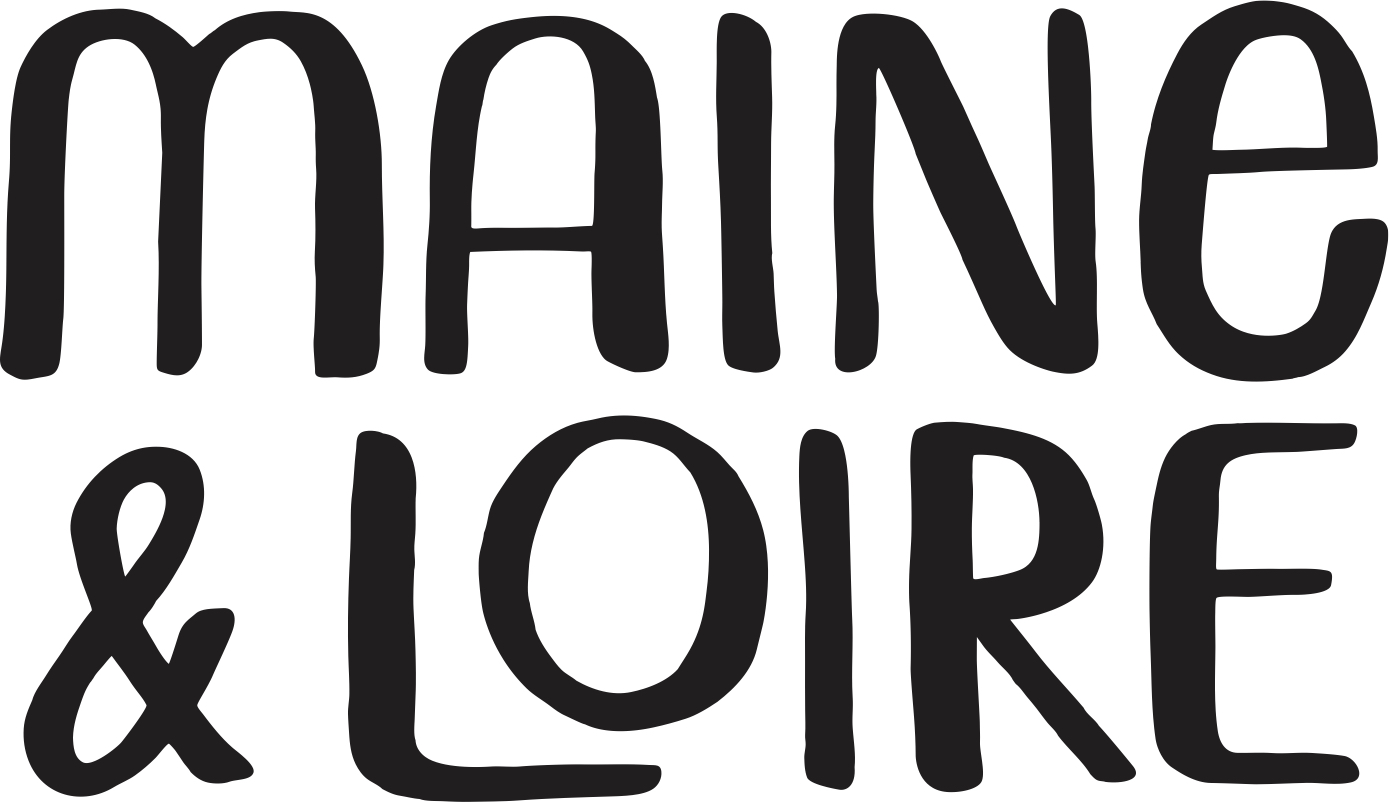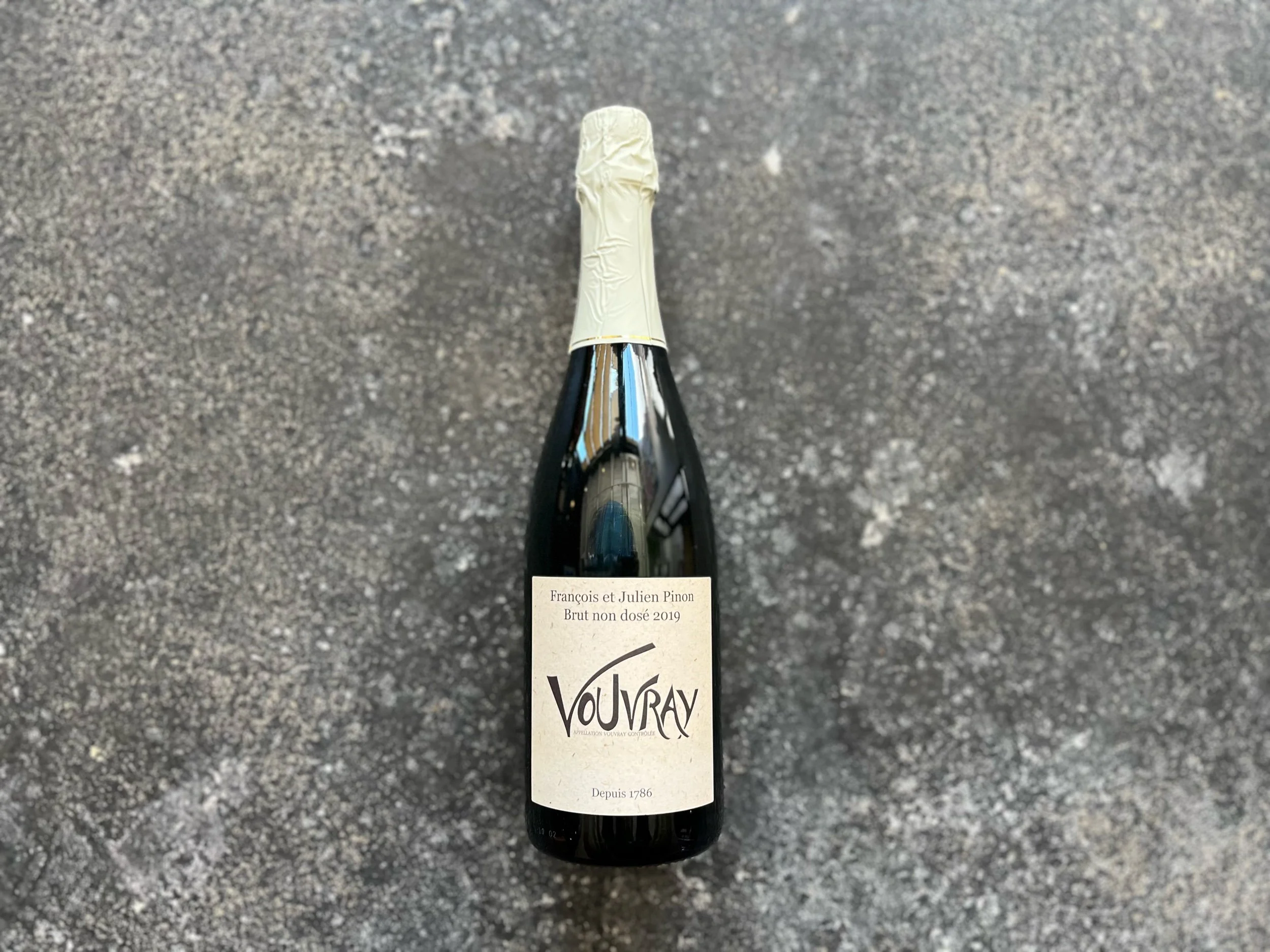Francois et Julien Pinon Brut Non Dosé Blanc 2019
Location: France, Loire, Touraine, Vouvray
Winemaker: François et Julien Pinon
Grapes: Chenin Blanc
Soil: flint, clay, tuffeau, limestone
Winemaking: Fermentation is spontaneous and lasts four to six weeks. The wine is then racked into old tonneaux and stainless steel tanks for two to three months of aging on the fine lees. The wine is then lightly filtered and bottled for its secondary fermentation. The wine ages an average of two years sur lattes before disgorgement and finishes dry with a scant gram or two of residual sugar.
Brut Non Dosé: from 45 year old vines. Pinon makes two brut sparkling wines, both of which are made with the méthode traditionelle. The later-harvested, riper fruit goes into this zero-dosage bottling to allow for a better balance in the final wine. Chalky, waxy, dreamy; very Champagne like. A masterpiece.
From the importer Louis/Dressner: The wines of François and Julien Pinon are considered among the finest of Vouvray. François, a former child psychologist, took over the estate from his father in 1987, and has steadily made a name for the estate. He is a serious winemaker whose main focus is "to keep the typicity of both the appellation and the vintage" in all his wines. Julien's arrival has cemented the family's dedication to organic viticulture and minimal intervention winemaking.
The vineyards are in the corniche of the Vallée de Cousse. The soil is clay and silica on a base of limestone (tuffeau) with flint (silex) and the area is rated among the top sites in the appellation for Vouvrays of distinction and long life. The Pinon follow a discipline of plowing the vineyards, not using chemical fertilizers and pesticides and, of course, he harvesting by hand and uses not using cultured yeasts in the cellar. All new plantings are done by selection massale and no nursery clones are used; the vines are an average of 25 years old. The estate has been certified organic since 2011.
The alcoholic fermentation occurs in wood barrels. Then the wines are aged in stainless steel or foudres (big casks, about twice the size of barrique Bordelaise) to obtain a balance between fruit and reduction. There is one racking to remove the heavy lees and the wine remains on its fine lees until bottling, which takes place a full year after the harvest to “finish” the wine. Rather than use a large dose of SO2, Pinon prefers to gently filter his wines to ensure their stability and aging potential.
A significant part of production are the sparkling wines (bottled brut nature and brut) produced from grapes on more neutral soils as well as the estate's youngest vines. The weather of the vintage will affect the amount of sparkling made each year: if it was a rainy year, the Pinon make more sparkling because in drier vintages, the grapes reach maturities more suited for still wines.
Location: France, Loire, Touraine, Vouvray
Winemaker: François et Julien Pinon
Grapes: Chenin Blanc
Soil: flint, clay, tuffeau, limestone
Winemaking: Fermentation is spontaneous and lasts four to six weeks. The wine is then racked into old tonneaux and stainless steel tanks for two to three months of aging on the fine lees. The wine is then lightly filtered and bottled for its secondary fermentation. The wine ages an average of two years sur lattes before disgorgement and finishes dry with a scant gram or two of residual sugar.
Brut Non Dosé: from 45 year old vines. Pinon makes two brut sparkling wines, both of which are made with the méthode traditionelle. The later-harvested, riper fruit goes into this zero-dosage bottling to allow for a better balance in the final wine. Chalky, waxy, dreamy; very Champagne like. A masterpiece.
From the importer Louis/Dressner: The wines of François and Julien Pinon are considered among the finest of Vouvray. François, a former child psychologist, took over the estate from his father in 1987, and has steadily made a name for the estate. He is a serious winemaker whose main focus is "to keep the typicity of both the appellation and the vintage" in all his wines. Julien's arrival has cemented the family's dedication to organic viticulture and minimal intervention winemaking.
The vineyards are in the corniche of the Vallée de Cousse. The soil is clay and silica on a base of limestone (tuffeau) with flint (silex) and the area is rated among the top sites in the appellation for Vouvrays of distinction and long life. The Pinon follow a discipline of plowing the vineyards, not using chemical fertilizers and pesticides and, of course, he harvesting by hand and uses not using cultured yeasts in the cellar. All new plantings are done by selection massale and no nursery clones are used; the vines are an average of 25 years old. The estate has been certified organic since 2011.
The alcoholic fermentation occurs in wood barrels. Then the wines are aged in stainless steel or foudres (big casks, about twice the size of barrique Bordelaise) to obtain a balance between fruit and reduction. There is one racking to remove the heavy lees and the wine remains on its fine lees until bottling, which takes place a full year after the harvest to “finish” the wine. Rather than use a large dose of SO2, Pinon prefers to gently filter his wines to ensure their stability and aging potential.
A significant part of production are the sparkling wines (bottled brut nature and brut) produced from grapes on more neutral soils as well as the estate's youngest vines. The weather of the vintage will affect the amount of sparkling made each year: if it was a rainy year, the Pinon make more sparkling because in drier vintages, the grapes reach maturities more suited for still wines.
Location: France, Loire, Touraine, Vouvray
Winemaker: François et Julien Pinon
Grapes: Chenin Blanc
Soil: flint, clay, tuffeau, limestone
Winemaking: Fermentation is spontaneous and lasts four to six weeks. The wine is then racked into old tonneaux and stainless steel tanks for two to three months of aging on the fine lees. The wine is then lightly filtered and bottled for its secondary fermentation. The wine ages an average of two years sur lattes before disgorgement and finishes dry with a scant gram or two of residual sugar.
Brut Non Dosé: from 45 year old vines. Pinon makes two brut sparkling wines, both of which are made with the méthode traditionelle. The later-harvested, riper fruit goes into this zero-dosage bottling to allow for a better balance in the final wine. Chalky, waxy, dreamy; very Champagne like. A masterpiece.
From the importer Louis/Dressner: The wines of François and Julien Pinon are considered among the finest of Vouvray. François, a former child psychologist, took over the estate from his father in 1987, and has steadily made a name for the estate. He is a serious winemaker whose main focus is "to keep the typicity of both the appellation and the vintage" in all his wines. Julien's arrival has cemented the family's dedication to organic viticulture and minimal intervention winemaking.
The vineyards are in the corniche of the Vallée de Cousse. The soil is clay and silica on a base of limestone (tuffeau) with flint (silex) and the area is rated among the top sites in the appellation for Vouvrays of distinction and long life. The Pinon follow a discipline of plowing the vineyards, not using chemical fertilizers and pesticides and, of course, he harvesting by hand and uses not using cultured yeasts in the cellar. All new plantings are done by selection massale and no nursery clones are used; the vines are an average of 25 years old. The estate has been certified organic since 2011.
The alcoholic fermentation occurs in wood barrels. Then the wines are aged in stainless steel or foudres (big casks, about twice the size of barrique Bordelaise) to obtain a balance between fruit and reduction. There is one racking to remove the heavy lees and the wine remains on its fine lees until bottling, which takes place a full year after the harvest to “finish” the wine. Rather than use a large dose of SO2, Pinon prefers to gently filter his wines to ensure their stability and aging potential.
A significant part of production are the sparkling wines (bottled brut nature and brut) produced from grapes on more neutral soils as well as the estate's youngest vines. The weather of the vintage will affect the amount of sparkling made each year: if it was a rainy year, the Pinon make more sparkling because in drier vintages, the grapes reach maturities more suited for still wines.

